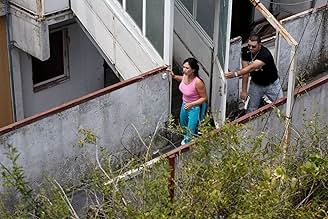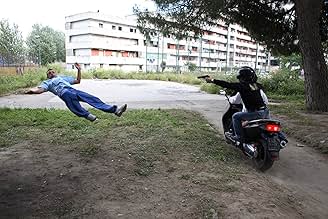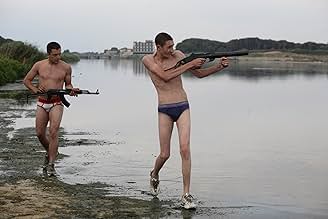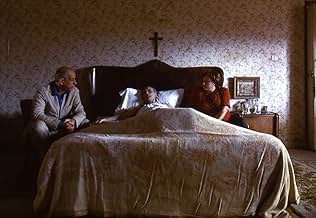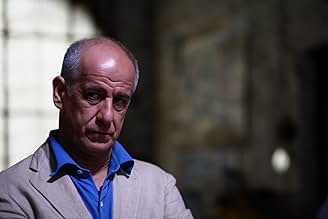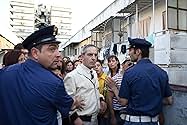Gomorra
- 2008
- Tous publics
- 2h 17m
IMDb RATING
7.0/10
52K
YOUR RATING
Scampia Vele is the Corbusian architecture which has become a stronghold for Mafia of Naples, Italy.Scampia Vele is the Corbusian architecture which has become a stronghold for Mafia of Naples, Italy.Scampia Vele is the Corbusian architecture which has become a stronghold for Mafia of Naples, Italy.
- Nominated for 1 BAFTA Award
- 34 wins & 42 nominations total
Salvatore Abbruzzese
- Totò
- (as Salvatore Abruzzese)
Vincenzo Altamura
- Gaetano
- (as Gaetano Altamura)
Featured reviews
In 2003, Giancarlo De Cataldo, a judge-turned-novelist, wrote Romanzo Criminale (Crime Novel in English), a largely truthful recollection (only the names were changed) of the Magliana gang, a Roman crime organization he had sentenced to prison. Three years later, Neapolitan journalist Roberto Saviano wrote Gomorra, a first-hand, non-fiction analysis of how organized crime controls everything in his native region. The book was the result of months of direct contact with the people who keep the System (the gangsters themselves refuse to use the word Camorra, which can be considered the local version of the Sicilian Mafia) and became a huge success, the downside of which was Saviano receiving multiple death threats from the people he'd exposed and being forced to live with a permanent police escort. The reason I'm mentioning both books is they were both made into successful films (Gomorra even walked away with the Grand Prize of the Jury at the 2008 Cannes Film Festival), with one crucial difference: Romanzo Criminale is very good, but does at times, as implied by the title, feel like a novel, a fictional story. Gomorra, on the other hand, using the same raw, in-your-face style as City of God, throws the viewer into a new, scary world - the real deal.
Director Matteo Garrone, who co-wrote the screenplay with a bunch of collaborators (including Saviano himself), wisely decides to ditch the book's first-person storytelling, the only (possible) reference to the author being a young man named Roberto who helps businessman Franco (Toni Servillo) close a series of suspicious deals with various companies in the North of Italy (Venice is explicitly shown). Franco's line of work, which will sound amusing to anyone who's watched The Sopranos, is waste management, though not of the legal kind. His story is one of five that constitute the film's narrative: along with him, there's also Don Ciro (Gianfelice Imparato), who pays the family members of imprisoned crooks; Pasquale (Salvatore Cantalupo), a tailor whose life is at risk because of his contacts with the Chinese (Italians don't like competition) and whose work ends up being worn by celebrities like Scarlett Johansson (Angelina Jolie in the book); and then there are two different examples of young blood, one a loyal boy who runs errands for his drug-dealing neighbors, the other two young punks who have watched Scarface way too often (a reference to the fact that a real-life Camorra boss had his villa designed exactly like Tony Montana's) and think they can take over.
An ensemble gangster flick, then. Not quite: this is no Altman movie, which means the separate plot strands never once cross paths. This is because Gomorra doesn't set out to be a real, straightforward story, but rather offer a series of bleak, extremely real examples of how the Camorra (or the System, though neither word is ever spoken in the film) controls everything. Aside from the documentary-style cinematography and anxious cutting, the highest degree of realism comes from the cast: the only really famous actor in the film is Servillo, familiar from Paolo Sorrentino's filmography; the rest have a theatrical background or, in the case of the kids especially, were taken directly from the street (the movie was shot on location, and rumor has it the mother of a Camorra boss asked for a cameo). This shows most clearly in the way they speak: with few exceptions (Franco most notably), the characters' Neapolitan dialect is so strong the film had to be subtitled in most parts of Italy. Garrone and Saviano's message is clear: this isn't your usual genre flick, it's something else - something palpable, something real, something terrifying.
Gomorra's top achievement is that it doesn't play to the stereotype of Italy being nothing but the home of gangsters. On the contrary, it pinpoints a sad fact, its intent being to denounce and make aware, never to glorify. Sure, it opens with a shootout that could remind of Goodfellas (still one of the best first-hand crime tales) or The Sopranos, but even those masterpieces are too smooth and polished next to the gritty, unsettling universe that emerges from this film. It's dirty, brutal, scary. And it simply has to be seen.
Director Matteo Garrone, who co-wrote the screenplay with a bunch of collaborators (including Saviano himself), wisely decides to ditch the book's first-person storytelling, the only (possible) reference to the author being a young man named Roberto who helps businessman Franco (Toni Servillo) close a series of suspicious deals with various companies in the North of Italy (Venice is explicitly shown). Franco's line of work, which will sound amusing to anyone who's watched The Sopranos, is waste management, though not of the legal kind. His story is one of five that constitute the film's narrative: along with him, there's also Don Ciro (Gianfelice Imparato), who pays the family members of imprisoned crooks; Pasquale (Salvatore Cantalupo), a tailor whose life is at risk because of his contacts with the Chinese (Italians don't like competition) and whose work ends up being worn by celebrities like Scarlett Johansson (Angelina Jolie in the book); and then there are two different examples of young blood, one a loyal boy who runs errands for his drug-dealing neighbors, the other two young punks who have watched Scarface way too often (a reference to the fact that a real-life Camorra boss had his villa designed exactly like Tony Montana's) and think they can take over.
An ensemble gangster flick, then. Not quite: this is no Altman movie, which means the separate plot strands never once cross paths. This is because Gomorra doesn't set out to be a real, straightforward story, but rather offer a series of bleak, extremely real examples of how the Camorra (or the System, though neither word is ever spoken in the film) controls everything. Aside from the documentary-style cinematography and anxious cutting, the highest degree of realism comes from the cast: the only really famous actor in the film is Servillo, familiar from Paolo Sorrentino's filmography; the rest have a theatrical background or, in the case of the kids especially, were taken directly from the street (the movie was shot on location, and rumor has it the mother of a Camorra boss asked for a cameo). This shows most clearly in the way they speak: with few exceptions (Franco most notably), the characters' Neapolitan dialect is so strong the film had to be subtitled in most parts of Italy. Garrone and Saviano's message is clear: this isn't your usual genre flick, it's something else - something palpable, something real, something terrifying.
Gomorra's top achievement is that it doesn't play to the stereotype of Italy being nothing but the home of gangsters. On the contrary, it pinpoints a sad fact, its intent being to denounce and make aware, never to glorify. Sure, it opens with a shootout that could remind of Goodfellas (still one of the best first-hand crime tales) or The Sopranos, but even those masterpieces are too smooth and polished next to the gritty, unsettling universe that emerges from this film. It's dirty, brutal, scary. And it simply has to be seen.
This is a collection of five stories about people who are touched by the gritty Neapolitan crime world. There is a gang war erupting. Don Ciro is a scared middleman. He is jumped by the other side and forced to take them back to his location. Roberto works in waste management and his boss Franco is dumping toxic wastes. Pasquale works as a high fashion tailor controlled by the mob. He moonlights for their Chinese competitor but it goes wrong. Marco and Ciro are young gangster wannabes. They get in over their heads.
This is a great faux-realistic take on the modern mob. It opens with a bang. I will always remember the waste disposal because of the subject matter. The two youngsters are probably the most compelling characters. There are some ups and downs. It's a disjointed watch. It's a wide-ranging take on the subject and proves to be an effective one.
This is a great faux-realistic take on the modern mob. It opens with a bang. I will always remember the waste disposal because of the subject matter. The two youngsters are probably the most compelling characters. There are some ups and downs. It's a disjointed watch. It's a wide-ranging take on the subject and proves to be an effective one.
The unglamourous reality of the workings of organised crime in Italy are revealed in this grim, thinly fictionalised story. There's no glamour here: just a form of business in which violence is an institutionalised part, a shadow state, in effect, only with a high rate of marginal taxation, a strong line on punishment, and no policy for the common welfare. The reality of how it feels to grow up in such an environment is plausibly conveyed. What we don't see, perhaps unsurprisingly, is too much sign of anyone showing heart; and in consequence, it's a bit hard to get into the story, and care for the mostly unsympathetic characters we meet. 'Gomorrah' isn't a great film; but it is a useful corrective against the myths of Hollywood, albeit one with a rather depressing view into one particular corner of the world.
Some publications gave Gomorra a perfect rating, while others gave more basic reviews but, in a week where The Times reviewed about 10 new releases and gave this 5 stars and everything else 1 or 2, I decided this was a film I should check out and that The House Bunny could perhaps wait for another time (specifically, when it is the last film on Earth). Gomorra opens with a beauty salon hit which I imagine is meant to introduce us to the violent and treacherous world of the Cammora crime syndicate in the locality of Naples, Italy. As an impacting opening, it does work but the "introduction" idea is sadly where the film is roundly weak and it does mean that it has the potential to confuse.
Before I get a barrage of messages pointing out to me that cousins shouldn't marry, I do not mean that I could not follow the specific threads of the film but just that the film offers nothing to inform the new viewer of the world that we are about to enter. I'm not sure the best of doing this but certainly at first I didn't totally appreciate the scale of the organisation, the structure or the setting and it took me a minute as a result to get into the stories. Unlike similar films, the separate threads never really come together in any way other than they share a grounding in location and the problem of the Cammora. Outside of a specific introduction for those coming in cold, the film does give a sort of introduction to the problem as we first follow one of the characters around the nightmarish, enclosed estate of flats which seems to perform the task of judge and prison-officer as those born into it have little opportunity to escape it and essentially have their fate sealed by virtue of their environment.
Within this feat of architecture we follow several threads including a money-man, a boy getting into the life on the lowest rung, a man starting out in the corrupt world of waste management, a black-market tailor looking to earn a bit more on the side and two young men who decide to seize power in their region from the old, fat men who sit at the top. In terms of engagement, there isn't really a huge emotional draw within the film but instead it all feels very realistic and dead - so it is not so much that you feel for the specific characters so much as you have a constant sense of hopelessness and of how small and petty it all it. This is not the Italian gangsterisms of The Godfather where there is a certain sense of class and aspiration, in Gomorra the top men are trapped in the world the same as everyone else - with more money perhaps but they are not living in mansions or controlling things from a tropical island. The delivery of the film helps this as it is well shot on location and has a hand-held feel of grit and dirt. I didn't really like the technique employed throughout where the focus was on the subject in the close foreground and everything else was blurred, even as it came into play in the scene but otherwise it was well done, with the sudden moments of violence made more impacting by not being seen due to confusion simulated in the camera or by quick editing.
Gomorra has been compared to City of God, Goodfellas and all the other crime films that get wheeled out for reviews. In most ways this is not really a fair description because Gomorra does not have the style and flair of those films, nor do all the narrative threads come together neatly in the way we have come to expect. However it is still an engagingly bleak and realistic look into the world of the Cammora that is well done even if it has flaws. It is not "enjoyable" per se due to the lack of flair, but it is a very good film nonetheless and, like City of God did with City of Men, it offers the potential for a mini-series to further explore and find stories from within this world.
Before I get a barrage of messages pointing out to me that cousins shouldn't marry, I do not mean that I could not follow the specific threads of the film but just that the film offers nothing to inform the new viewer of the world that we are about to enter. I'm not sure the best of doing this but certainly at first I didn't totally appreciate the scale of the organisation, the structure or the setting and it took me a minute as a result to get into the stories. Unlike similar films, the separate threads never really come together in any way other than they share a grounding in location and the problem of the Cammora. Outside of a specific introduction for those coming in cold, the film does give a sort of introduction to the problem as we first follow one of the characters around the nightmarish, enclosed estate of flats which seems to perform the task of judge and prison-officer as those born into it have little opportunity to escape it and essentially have their fate sealed by virtue of their environment.
Within this feat of architecture we follow several threads including a money-man, a boy getting into the life on the lowest rung, a man starting out in the corrupt world of waste management, a black-market tailor looking to earn a bit more on the side and two young men who decide to seize power in their region from the old, fat men who sit at the top. In terms of engagement, there isn't really a huge emotional draw within the film but instead it all feels very realistic and dead - so it is not so much that you feel for the specific characters so much as you have a constant sense of hopelessness and of how small and petty it all it. This is not the Italian gangsterisms of The Godfather where there is a certain sense of class and aspiration, in Gomorra the top men are trapped in the world the same as everyone else - with more money perhaps but they are not living in mansions or controlling things from a tropical island. The delivery of the film helps this as it is well shot on location and has a hand-held feel of grit and dirt. I didn't really like the technique employed throughout where the focus was on the subject in the close foreground and everything else was blurred, even as it came into play in the scene but otherwise it was well done, with the sudden moments of violence made more impacting by not being seen due to confusion simulated in the camera or by quick editing.
Gomorra has been compared to City of God, Goodfellas and all the other crime films that get wheeled out for reviews. In most ways this is not really a fair description because Gomorra does not have the style and flair of those films, nor do all the narrative threads come together neatly in the way we have come to expect. However it is still an engagingly bleak and realistic look into the world of the Cammora that is well done even if it has flaws. It is not "enjoyable" per se due to the lack of flair, but it is a very good film nonetheless and, like City of God did with City of Men, it offers the potential for a mini-series to further explore and find stories from within this world.
When most people think of the mafia they think of American mobsters or Sicilians; this film tells of a group even more dangerous... The Camorra on Naples. Rather than having a conventional narrative we get glimpses into the lives of various people connected to crime in the city. Marco and Ciro; a pair of wannabe gangsters who operate independently and think they've hit the big time when they find a Camorra weapons stash; Don Ciro, a timid middleman who delivers payments to the families of gaoled gang members; Pasquale, a tailor who works at a factory controlled by the mob and Totò a thirteen year old grocery delivery boy who gradually gets caught up in the crime, amongst others. We see who the Camorra has its tentacles everywhere; drugs, weapons, fake designer goods and illegal disposal of toxic waste. The crime is profitable and the various subgroups are more than willing to kill to keep control of what they have already or to take what they want from others.
This film is far from being a feel good story; it never glamorises the criminal lifestyle but instead shows how it ruins the lives of those it touches like a cancer eating away at the society. Nobody here is seen living the high life. The way it is filmed with hand held cameras on real locations give the film an almost documentary feel; as though we are there with real gangsters not seeing people act. The actors all do a good job at making their various characters seem real. There are plenty of shocking moments even when one has been primed to expect something bad to happen. Perhaps the biggest shock is that all of this is happening in a modern European country not somewhere less developed. Overall I'd definitely recommend this to people interested in the subject; just don't expect any laughs or thrills... the violence is sudden and brutal not exciting.
These comments are based on watching the film in Italian with English subtitles.
This film is far from being a feel good story; it never glamorises the criminal lifestyle but instead shows how it ruins the lives of those it touches like a cancer eating away at the society. Nobody here is seen living the high life. The way it is filmed with hand held cameras on real locations give the film an almost documentary feel; as though we are there with real gangsters not seeing people act. The actors all do a good job at making their various characters seem real. There are plenty of shocking moments even when one has been primed to expect something bad to happen. Perhaps the biggest shock is that all of this is happening in a modern European country not somewhere less developed. Overall I'd definitely recommend this to people interested in the subject; just don't expect any laughs or thrills... the violence is sudden and brutal not exciting.
These comments are based on watching the film in Italian with English subtitles.
Did you know
- TriviaRoberto Saviano got death threats from the Camorra for exposing their activities in the novel and movie, and is now permanently under police protection.
- GoofsAt the beginning of the movie you can clearly see the character named Amerigo belly moving, when his dead body remains on the chair, where he has been having his nails cut.
- Alternate versionsIn 2020 Matteo Garrone re-cut the movie, reducing the length to 125 minutes.
- ConnectionsFeatured in De wereld draait door: Episode #4.31 (2008)
- SoundtracksHerculaneum
Written by Robert Del Naja and Neil Davidge
Performed by Massive Attack
Additional programming by Euan Dickinson
Courtesy of One Point Six
Details
Box office
- Gross US & Canada
- $1,579,146
- Opening weekend US & Canada
- $5,532
- Dec 21, 2008
- Gross worldwide
- $34,861,529
- Runtime2 hours 17 minutes
- Color
- Sound mix
- Aspect ratio
- 2.35 : 1
Contribute to this page
Suggest an edit or add missing content


![Watch Trailer originale italiano [OV]](https://m.media-amazon.com/images/M/MV5BMjYxMDk3OTItZDQxNC00MTlkLTlkNGYtZWVhMzgzM2M5NWFmXkEyXkFqcGdeQXRyYW5zY29kZS13b3JrZmxvdw@@._V1_QL75_UY281_CR13)


